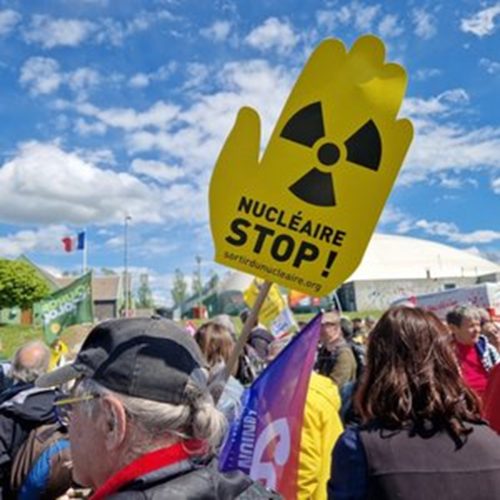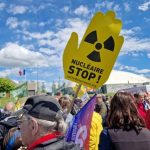
About this Episode

Last Saturday, a crowd of protesters gathered in the town of Cattenom, close to the nuclear power plant. Anti-nuclear energy organizsations from France, Germany and Luxembourg gathered next to the sports hall to then march to the gates of the reactors together.
One quarter of all energy in the European Union is nuclear – with France accounting for half of all nuclear energy. 56 reactors are operational in France, and one is under construction.
The number of nuclear reactors operational in Europe had decreased over the past decades – many were taken of the network due to their age. Security concerns overtook. After the disaster in Chernobyl in 1986, the number of new construction projects dropped sharply. Whereas more than 100 power plants were inaugurated in the 1980s, only 15 new plants were launched after 1990. More than 50 were taken off the network. Most nuclear power plants in Europe date from the 70s and 80s, they are old and prone to disturbances – a major concern for anti-nuclear activists.
Amid growing dependency in energy supply and rising energy cost, many EU countries in their search for alternatives consider going back to nuclear energy. At the end of March, around 30 European leaders and delegates gathered in Brussels for the first-ever nuclear Energy summit. Although opinions across Europe remain divided, many countries are open to revise their position. Luxembourg’s Prime Minister Luc Frieden, after attending the summit, triggered public outrage over favourable comments on nuclear energy. Later the government backpedalled, reassuring the public that renewable energy remains Luxembourg’s priority. Behind Luxembourg’s borders however, Frieden’s government doesn’t have a say. The closest nuclear power plant is located only 8 kilometres from Luxembourg’s southern border, in Cattenom.
Numerous Luxembourgers were present at the protest last weekend. The protesters oppose the planned prolongation of the energy production in Cattenom.
Greenpeace Luxembourg currently calls for signatures on their petition to end the lifetime of the Cattenom reactor in 2026. Reactor 1 then will have been active for 40 years, the limit lifetime for which it had been conceived.
Currently a consultation process is taking place. The local and national authorities invite residents of Luxembourg, France and Germany to join the consultation. For several reactors across France, the extension of the lifetime has already been authorized. To make the reactors last longer, the energy supplier Electricite de France (EDF) has planned several maintenance works. Mid-May, the public is invited to learn more about the planned maintenance works and to debate.
Greenpeace Luxembourg has commissioned a report on the security of the Cattenom reactors. Current security standards are set by the European Union. They apply to the new power plant in the French city of Flamanville which is currently in construction. Those standards also apply in case of reassessment of older reactors.
Manfred Mertins is an expert for nuclear reactor safety. He says: “Nowadays, security standards are much higher than back in the day, in the 70s or 80s. Because we have learned a lot since then.”
He refers to the nuclear disasters of Three Mile Island, Chernobyl and Fukushima as well as the 9/11 plane crash. The consequence of all these incidents were tighter safety rules for nuclear power plants. Mertens says: “There are significant deviations from current security standards – concerning redundance, its location, internal floods or blazes, seismic risks. We also know that external risk factors such as earthquakes, floods and plane crashes haven’t been considered during the risk analysis.”
Additionally, the circumstances have changed over the past decades. The reactors were built according to the conditions in that time. Climate change however leads to extreme storms and heavy rain for which the drainage system isn’t sufficiently equipped.
For the protesters present at the demonstration on Saturday, nuclear energy is a thing of the past. Many of them already protested nuclear energy 40 years ago, other participants are younger. “Nuclear energy isn’t safe. It’s dangerous for the population. We need to change the energy model, solar energy or so – a safe model, not a dangerous one”, one participant says. Another one says: “Near my home, the authorities plan to bury nuclear waste. It’s near Bure, in the department of Meuse. It’s very close to here.“ Near Bure, France’s Nuclear Safety Authority (ASN) plans to build a centre for radioactive waste disposal. For 20 years, the ASN studied the conditions and finally gave the green light for the nuclear waste centre. For the few residents such as Regine, this is unacceptable. The Meuse region isn’t a nuclear dump, a transparent sticked on a dustbin says. For the reactor in Cattenom meanwhile, residents can still voice their opinion. The public consultation for the extension of the reactor has just started









